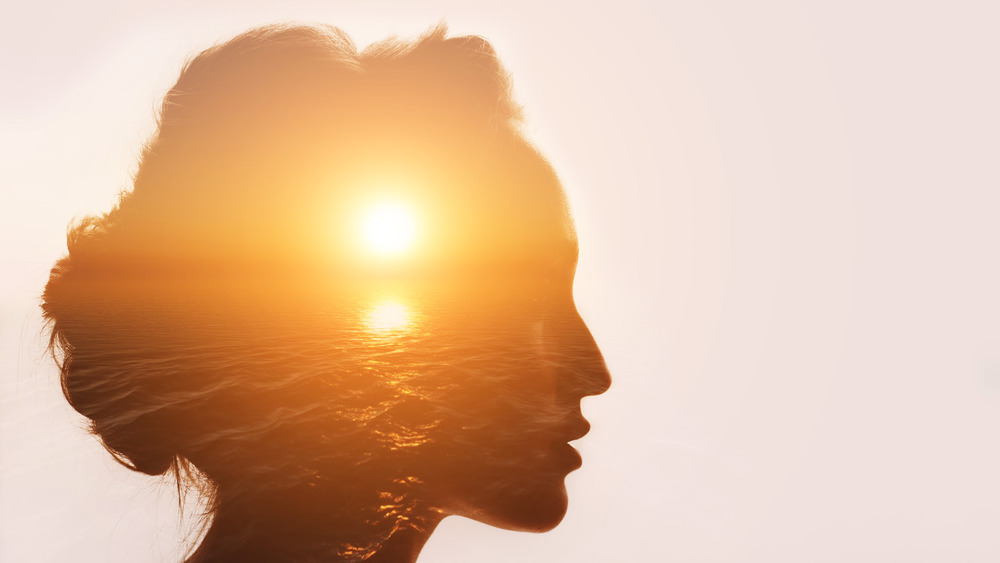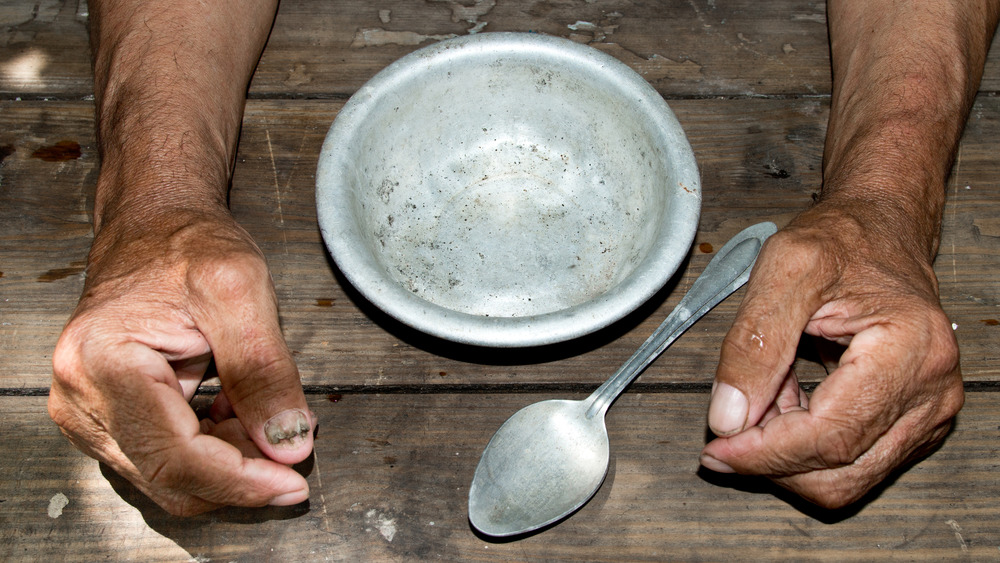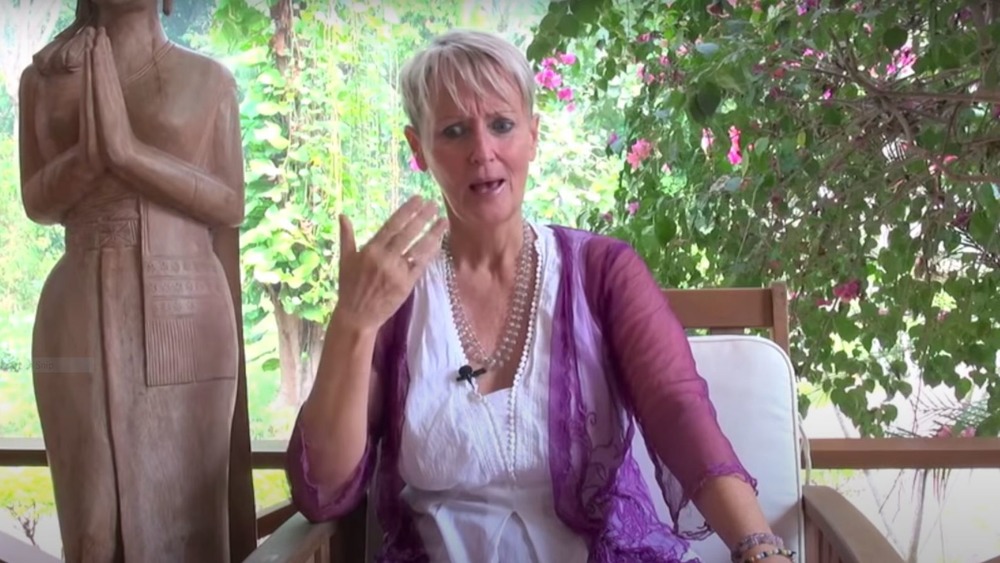The Potentially Deadly Pseudoscience Of 'Breatharianism' Explained
Free from pain, free from fear. Free from want, free from pharmaceuticals. Free to enjoy nothing but the joy of life: Sounds like an appealing prospect, no? Such is the life promised followers of "breatharianism," a potentially deadly pseudoscience that combines extreme forms of yogic and self-mortification practices into a simple tagline: Don't eat or drink — just live on life-force, and bam: enlightenment. And indeed, breatharians equate simple, everyday ingestion with being un-spiritually-awake. Eating and drinking indicates an unnecessary dependence on slavish, material meat-shells of bodies, one that ignores an inner truth of interconnectedness that if only accessed, could finally free people from bondage. But sorry, you have to ditch the pizza.
Maybe you're thinking: Hey, that sounds the old idea that "body" and "spirit/mind" are separate entities. That it's reminiscent of medieval Catholic "Mortification of the Flesh" practices, like extreme fasting, to discipline the spirit. That it even echoes self-mummification practices of certain Buddhist monks, but with an extra big helping of motivational fake-guru talk by way of cultish fringe New Age beliefs. Well, yeah: bingo.
So if these folks don't eat food, what do they eat? As 1990's breatharian icon Jasmuheen says in a YouTube documentary posted by adherent Matei Georgescu: It's about prana. And what's that? In Jasmuheen's words, "Prana is that energy force that's breathing us, and allowing molecules to come around this essence energy so we can have life in this realm."
What breatharianism has in common with other beliefs
The idea of the universe being composed of one life, energy, spirit — prana, as ancient yogis called it (per Divine Yoga Bangkok) — is not at all new, nor exclusive to breatharians. Admittedly, plenty of ancient and modern belief systems share aspects with breatharianism, hinged around the word "breath."
In Latin, the word for "spirit" and "breath" are the same. The Greek word pneuma holds a similar place, itself translated into "breath of life" by Biblical writers. Those familiar with the Old Testament will know that God used breath to create Adam. The Vatican recounts the origins of the Hebrew word ruah to describe how the Christian Holy Spirit passes through all life like "breath, air, wind." Gnostics (per the Olympia Gnostic Center), indigenous peoples such as the Lakota (per the American Academy of Arts and Sciences), neo-paganists such as Wiccans (per Witchbeme): There's an abundant source of traditions, religions, and individuals who share the central tenet of the universal being composed of one — as they say in "Star Wars" – force.
None except breatharians, however, advocate deriving nourishment from this energy at the cost of perpetual fasting. How do they claim it's done? Perhaps Yogi Sadhguru's YouTube lecture on functioning "friction-free," or dwelling in a hyper-meditative state on minimal "RPMs," provides some clue.
A string of deaths and dubious claims of success
This is the heart of breatharian belief and danger: fasting is both the prerequisite to, and result of, progress. Food and drink must be given up in order to foster spiritual development, and then once achieved, an adherent can push further.
And so, we have Camila Castello and Akahi Ricardo (in the aforementioned Matei Georgescu video on YouTube) who claim to have not eaten since 2007, despite having had two children during that time. Castello said, "If I choose to eat or drink something, it's not because I feel hungry. I don't remember what that sensation feels like." On a smaller scale, we have YouTube raw dieter "Casey" who claims to be "on the pranic/breatharian path" by drinking only liquids, smoothies, and soup.
And then, per The Guardian, we have a 49-year old woman who died in 1999 while embarking on breatharian icon Jasmuheen's 21-day "conversion" course, described in Jasmuheen's 1997 book "Living on Light: The Source of Nourishment for the New Millennium," which contains a kind of abstinence program from all food and drink. In fact, as Vice outlines, five people have died from following Jasmuheen into breatharianism, including a woman in 1999 who stuck with it despite having a stroke and "vomiting black liquid for days," and a more recent (2012) Swiss woman.
In response, Jasmuheen stated that the deceased had "not [been] coming from a place of integrity and did not have the right motivation."
A moneymaking, 'pranic living' empire
Who is this woman leading the charge into breatharianism? Australian-born Ellen Greve, aka "Jasmuheen," who left her life as a mortgage broker to pursue "Pranic Living." On Jasmuheen's website, she sells a veritable empire of online courses, guided meditations, audiobooks, music — you name it — under programs named "Enchanted Kingdom," "Embassy of Peace," and including in-person events such as "Darkroom Retreats," which involve being plummeted into darkness for nine days and nine nights without food "like a yogi in a cave," as she says on YouTube.
Also included on the website is a biographical series in which Jasmuheen describes how she glimpsed "parallel time lines" that "[M]erged her with her future self in 1998. This has allowed her to understand and work with Interdimensional Energy Field Science to understand how Source feeding is possible along with the formula for personal, planetary and universal ascension." In another YouTube interview she talks about how bypassing digestion can help "energies go straight up into working with brainwave capacities, paranormal powers, all sorts of ways, opening you up in many realms you can imagine as a human system can operate."
Jasmuheen, though, is neither the first, nor the only one, to sell this kind of belief. Castello and Ricardo have taken up the mantle and created breatharianism instructional materials and seminars. Back in 1983, as UPI reports, breatharian leader Wiley Brooks, who charged hundreds for seminars, was caught ordering chicken pot pie and biscuits at a hotel, and leaving a 7-Eleven carrying a bag of groceries.
The true costs of, and reasons for, breatharianism
So is there anything — anything at all — that's credible about breatharianism? Is it possible to live without food or water? The answer to the latter — and it's absurd to even have to say this explicitly — is "no." It isn't possible for organisms built from the ground-up, from the cellular level, designed for consumption and the breakdown of matter into nutrients, to exist without food or water. Plants photosynthesize; animal cells, like those of human beings, do not. Sure, intermittent fasting, and full-on fasting, can be healthy, as Healthline reports, and it's admirable to be respectful of your body's own vital life. That's why it's important to, you know, eat and drink well. Seen another way, when we consider those suffering from hunger worldwide, or people with eating disorders such as anorexia nervosa, the practice of breatharianism comes across as, frankly, shameful.
Nonetheless, people continue to be drawn to breatharianism. Why? Author Breena Kerr, writing for GQ, reported attending a breatharian event in 2017 in California hosted by Akahi Ricardo, who flew in from Costa Rica to host the $1,700, "8-Day Process." Afterwards, he was flying out to Poland for a 21-day version. There's talk of chakras, "light energy," and other hodgepodgery that sounds vaguely lifted from wellness industry ads. Ricardo, when asked why he practiced breatharianism, replied, "I felt cleaner, I felt sharper. I felt ... fearless."
Maybe this is enough for some to accept breatharianism's true costs.




